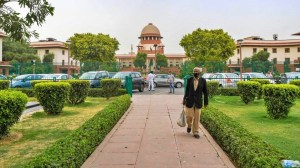- India
- International
Lack of social security for women in informal economy needs to be addressed
Investing in them and their capacity-building will serve as a bulwark for the daily health crises that people face and also the pandemics and epidemics of the future.
 As the suffering of informal, migrant workers plays out across India, we note that along with no livelihood, the vast majority of our citizens, mainly informal workers, cannot seek support from even basic social security. (File Photo/Representational)
As the suffering of informal, migrant workers plays out across India, we note that along with no livelihood, the vast majority of our citizens, mainly informal workers, cannot seek support from even basic social security. (File Photo/Representational)
It was in the middle of the second lockdown. Ayeshaben, a home-based garment worker suddenly experienced chest pain. Her son, Asif, a tailor, requested one of his customers to take his mother in his rickshaw to the hospital. Thankfully, Ayeshaben has been taking insurance cover with SEWA’s insurance cooperative, VimoSEWA, for the last 15 years. Her claim of Rs 5,000 was processed online after Asif sent all her documents via WhatsApp.
There are millions of Ayeshabens in this country. More than 90 per cent of working people in our country are engaged in the informal economy. The most vulnerable are women who suffer from multiple disadvantages — as women, as poor, informal workers and as members of the socially disadvantaged castes and communities that predominate the informal sector. They keep the wheels of our economy turning with their labour, and yet they have limited or no social protection to act as a cushion in hard times.
As the suffering of informal, migrant workers plays out across India, we note that along with no livelihood, the vast majority of our citizens, mainly informal workers, cannot seek support from even basic social security.
Social security for all informal workers, including migrants, has been a long-standing demand of unions like the Self-Employed Women’s Association, SEWA, and other national unions. From our SEWA sisters we have learned — over almost five decades — of organising women into unions and cooperatives. We have learned that work security and social security are two sides of the same coin. The proposed economic stimulus and livelihood packages, recently announced, will hopefully translate into some support for informal workers. But, we need to think about their minimum social security — both to tide over the current crisis and for longer-term support.
What Ayeshaben and Savitaben also taught us is that their need for social security must include at least health care, child care, insurance, pension and housing with basic infrastructure like a tap and toilet in every home. Their experiences informed the WHO’s Commission on the Social Determinants of Health which has now become a gold standard for public health in many countries. Their voices also ring out in the government’s own High Level Expert Group (HLEG) on Universal Health Coverage and later the National Health Policy 2017. Both are landmark documents for Indian public health which may need tweaking and re-visiting in light of the pandemic, but stand out for their vision for universal health care, with primary healthcare as the bed-rock. Both call for major changes in the public health priorities and architecture. The current pandemic has brought home the fact that those states with strong public health systems, decentralised planning and implementation through PRIs with active community participation, and, partnerships with civil society organisations — local cooperatives, unions, collectives and others — were able to meet the COVID-19 challenge and flatten the curve. Much has been written about Kerala. Goa, Sikkim and other states, too, have shown us the way.

In sum: There is no getting away from re-committing ourselves to the investments outlined in the HLEG report of 2011 and the more recent NHP 2017—2.5 to 3 per cent of GDP has to be allocated for public health, with the main investment in primary health care and a force of frontline workers, preferably women, to tackle both communicable and non-communicable diseases. They have already, ably and selflessly, served their local communities during this pandemic — in both villages and informal settlements in our urban areas. Investing in them and their capacity-building will serve as a bulwark for the daily health crises that people face and also the pandemics and epidemics of the future. Both policy documents call for universal health care — leaving no one behind.
We have also learned that childcare is an essential service required for poor, working women — indeed, for all working women in India. If there is one thing we need to do to support increased female workforce participation, it is full-day child care. Our studies over the years have shown that women’s incomes double as a result of full-day care for their young children. Women tell us that they can bring in better quality food for their families, and that their older children — especially girls — can go to school, as they are relieved of childcare responsibilities. One study we did of crèches for tobacco workers children in Kheda district showed that 70 per cent of the older siblings entered school for the first time once we set up full-day crèches in their villages. We can build on the already existing Integrated Child Development Scheme (ICDS) infrastructure and convert these into centres for overall child development with nutrition, health care, early childhood and value-based education. Local women, in our experience, are most suited to running such holistic childcare centres with proper capacity-building training and support, and fair remuneration at minimum wage level. Again, we have models of this from some of our states and also several civil society initiatives. SEWA has experimented with childcare cooperatives which not only provide care at the local level to young children of working women but also provide livelihood and respect for the care-givers in their communities. Similarly, Mobile Creches has developed low-cost but high quality models of care, including for migrant construction workers. Universal childcare can easily be implemented: It is required now more than ever as we learn of possible declines in nutrition levels and increases in malnutrition in the wake of this pandemic, with families running out of food and cash.
There is also the importance of insurance cover for all workers. PMJAY may have made a solid start for some but there are still lakhs of workers who are not eligible due to the enrolment criteria or because they are still struggling to fully comprehend the system — where to go, whom to ask for help and more. Besides, health insurance is not the only coverage that workers need. They require a comprehensive cover with products covering several of the many risks they face every day — life, accident, asset, crop and cattle and small animal insurance, to mention a few. Over VimoSEWA’s work of almost three decades, we have seen that the bundling of products — providing them through one window and at the same time — and tailoring services to the needs of the working poor is what works best. They are ready to pay if they trust the service and see the system servicing their needs promptly. Recently, the Insurance Regulatory and Development Authority of India (IRDAI) has developed an important set of recommendations to increase the spread of microinsurance, both bundled and unbundled products, in low-income populations. These can be taken forward easily in the current pandemic and post-pandemic period. We can no longer wait till the next pandemic, which experts warn is not far off, to provide some basic cover to all our citizens, especially those whose lives are most at risk.
Pension is well-recognised as another essential aspect of social security. Already states and the central government have announced increases in the pension amounts for workers. These need to be examined together with unions, cooperatives and other collectives of informal workers to see how appropriate they are and also how these can reach all in a timely and simple manner. In fact for all of the social security mentioned above, we need to set up a taskforce to examine how social security can reach all informal workers in the simplest, most timely and appropriate manner. This applies to housing and basic infrastructure as well which are huge issues in and of themselves. One cannot do justice to these in one article.
We can no longer wait. Informal workers and others in this country have waited long enough. The pandemic has exposed all sorts of holes in our preparedness—whether of our public health services or of our social security systems. The consequences of the lack of social security are there for all to see both during this pandemic and after.
We need to set up a small taskforce of those who have been thinking and working on this subject and have experience of what is required at the grassroots level. This could include trade union and cooperative representatives, those from various collectives like Self-Help Groups (SHGs) and their federations, PRI members, NGOs, researchers and academics and of course, government representatives from the states and the centre. Such initiatives have been undertaken as part of the Second Labour Commission, the National Commission on Enterprises in the Unorganised Sector (NCEUS), and with the Ministries of Labour and Employment, Finance, Health and Family Welfare, and others.
Some years ago, in partnership with the Ministry of Labour and Employment, we had developed a set of recommendations. One of these was that the finance ministry be the nodal ministry, bringing in several other relevant ministries under a common body to plan for universal social security. At that time, calculations were made on how much this would cost and how it could be rolled out. Careful thought has already been given to implementation mechanisms and issues such as identification of informal workers through portable identity cards and digitalisation. We need to re-visit the reports of these Commissions and Committees through a task force which would also bring in fresh thinking in light of what we know and have learned from the pandemic, and also deliberate on decentralised and simple implementation mechanisms. We know what we need to do for the working people of this country. Now we need to act on it.
This article first appeared in the print edition on May 21, 2020 under the title ‘The safety net she needs’. The writer is director, Social Security, Self-Employed Women’s Association (SEWA)
EXPRESS OPINION
Apr 25: Latest News
- 01
- 02
- 03
- 04
- 05










































